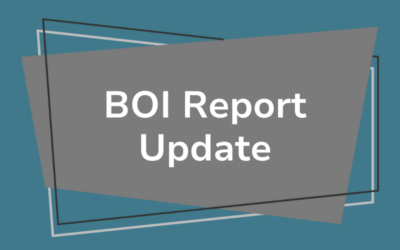The new year is right around the corner, which means businesses across the United States need to start thinking about filing taxes for 2024 It’s time to determine deadlines and research any legislative and tax code changes that may affect you and your company. For guidance in preparing your 2024 tax return, I encourage you to talk with a professional tax expert. In the meantime, here’s a quick overview of what business owners should consider when filing their taxes in 2025
Sole Proprietorship Taxes
Sole Proprietorships are unincorporated businesses with no distinction between the business owner and the business. The business owner is responsible for all the business’s debts, losses, and liabilities.
Business earnings are considered personal income, and at tax time, sole proprietors need to file a Schedule C (IRS Form 1040) “Profit or Loss From Business.” The filing deadline for this year is Tuesday, April 15, 2025.
Also, most Sole Proprietorships must submit estimated tax payments quarterly. According to the Internal Revenue Service (IRS), estimated taxes are for income that is not subject to withholding, including earnings from self-employment, investments, rentals, retirement plans, etc.
Although state income tax due dates vary, for Sole Proprietorships, the deadlines are the same as the federal tax deadlines.
Partnership Taxes
Like Sole Proprietorships, there is no legal separation between the business owners and the company in General Partnerships. So business taxes are passed through to the partners, who are all deemed equal and are taxed equally by the IRS (unless the company’s partnership agreement specifies otherwise.)
In a Limited Partnership (LP), there are:
- General partners who make business decisions, manage operations, and have personal liability for the company’s legal and financial debts.
- Limited partners who invest money or property in the Limited Partnership but have no operational responsibility, nor are they personally liable.
Partnerships use IRS Form 1065 (the U.S. Return of Partnership) to calculate and submit their profit or loss. On the form, Partnership owners must list the business’s revenues and expenses and answer several yes or no questions about the company.
A Partnership must also file a Schedule K, which breaks the Partnership’s income into different categories, such as ordinary business income, rental income, and interest income. Next, the company fills out a separate Schedule K-1 for each partner where the partner’s share is listed.
General and limited partners must receive a Schedule K-1 from the Partnership for their tax filings. This is also the case for a Limited Liability Partnership (LLP) and Limited Liability Limited Partnership (LLLP).
The due date to submit Form 1065, Schedule K, and Schedule K-1 is the 15th day of the third month after the end of the Partnership’s tax year. For Partnerships using December 31 as their year-end, the Partnership return due date is Monday, March 17, 2025. Also, partners are not employees and should not be on payroll or issued a W-2 Form. Rather, they can take distributions or guaranteed payments, which are subject to estimated taxes
Limited Liability Company Taxes
Whether a Limited Liability Company (LLC) is a single-member or multiple-member LLC, it is considered a separate entity from its members. By default, a single-member LLC is taxed like a Sole Proprietorship, with the same tax forms (Form 1040 and Schedule C) and deadlines. Also, by default, a multiple-member LLC is taxed like a Partnership with the same tax forms and deadlines (Form 1065 and Schedule K and K-1).
LLC members can also elect to be taxed as a C Corp or an S Corporation. If the LLC elects a C or S Corporation status, different forms and due dates apply (see below).
C Corporation Taxes
C Corporations are separate legal entities from the business owners and file separate tax returns from the owners. C Corporation owners who work for the company are considered employees of the corporation and must receive a W-2 from the Corporation. C Corps operating on a calendar year basis must file IRS Form 1120 (U.S. Corporation Income Tax Return). This year, the deadline is Tuesday, April 15, 2025. For C Corps that don’t use a calendar year, the filing deadline is the 15th day of the fourth month following the end of their fiscal year. Typically, if Corporations expect to pay more than $500 in taxes, they must make estimated tax payments using Form 1120-W.
Corporate income taxes are paid at a flat 21% corporate income tax rate. Basic information required on Form 1120 includes the Corporation’s name, address, Federal Tax ID Number (EIN), list of assets, and profit and loss information. Wednesday, October 15, 2025 is the final extended deadline (for the fiscal year ending December 31, 2024 to file individual and corporate tax returns for the tax year 2024 using Form 1040 and Form 1120. Corporations must request a filing extension by the original due date of Tuesday, April 15, 2025.
S Corporation Taxes
The S Corporation is a special election offered to LLCs and C Corps, allowing them to be taxed like a Partnership (or as a Sole Proprietorship in the case of single-member LLCs), thus avoiding the double taxation corporations experience. As in a partnership, all business income is passed through to the owners and taxed at the individual tax rate. As a bonus, S Corporations maintain the personal liability protection available to C Corps.
S Corporations file IRS Form 1120-S. This year, that form is due Monday, March 17, 2025 for those corporations operating on a calendar year), with an extended deadline of Monday, September 15, 2025. Again, if the corporation is not on a calendar year, the tax filing due date is the 15th day of the third month following the end of the fiscal year.
To be treated as an S Corporation, the business must complete and file IRS Form 2553 no more than two months and 15 days after the beginning of the tax year the election is to take effect or at any time during the tax year preceding the tax year it is to take effect. Late election relief is available using Rev. Proc. 2013-30.
Reminder About 1099-NEC Forms: Any business that has paid more than $600 for services to subcontractors and vendors who are not employees must distribute Form 1099-NEC to them, usually by January 31 of every year. The deadline is January 31, 2025 for the 2024 tax year. The business must also file Form 1096 to report these payments by the same deadline.
Changes for Filing Business Taxes in 2025
Here are some changes that will impact some tax returns for the 2024 tax year:
- The standard mileage rate for business use of a vehicle is 65.5 cents for the 2023 tax year and 67 cents for the 2024 tax year.
- The IRS has delayed the requirement that payment apps and online marketplaces (e.g., PayPal, Venmo, Amazon, Shopify) issue 1099-K forms to taxpayers who receive over $600 in digital payments. That requirement was supposed to go into effect for the 2023 tax year but has now been modified to be phased in over the next several years as follows: third-party settlement organizations (TPSOs) will be required to report transactions when the amount of total payments for those transactions is more than $5,000 in 2024, more than $2,500 in 2025, and more than $600 in calendar year 2026 and after. Learn more about 1099-K relief.
- The meals and entertainment deduction rules have changed. Businesses were allowed to deduct 100% of meal expenses in tax year 2022. For tax year 2023, they may deduct only 50%. Some meals, such as those for events held for employees, customers, or the general public, are fully deductible. Entertainment expenses (such as concert or theater tickets) are no longer deductible.
- Pass-through business owners (Sole Proprietorships, Partnerships, LLCs, and S Corporations) may deduct 20% of qualified business income for 2024 if their total income is not more than $191,950 (if filing single) or $383,900 (if filing jointly) before the QBI deduction. Those amounts are up from 2023’s income caps of $182,100 (single) and $364,200 (jointly). Keep in mind that business owners may not be eligible for the full 20% deduction if their business is considered a “specified service trade or business.” Please see draft of 2024 Instructions for Form 8995 for 2024 QBI Income limits.
- The 2022 tax year was the last year where businesses could deduct 100% of qualified bonus depreciation for fixed assets. For tax year 2024, the maximum deduction is 60%, with the deduction decreasing by 20% each year in the years to follow (i.e., 40% in 2025, 20% in 2026, and 0% in 2027 and after). Section 179 depreciation is a set dollar limit you can deduct for new or used business assets. The Section 179 depreciation limit for 2023 is $1,160,000 and for 2024 is $1,220,000 for federal purposes per Publication 946. States will have varying dollar limits for Section 179 depreciation. Please note vehicles have separate limits for both bonus depreciation and Section 179 depreciation.
Is It Time to Change Your Entity Type?
As you work with your accountant or tax advisor to prepare your income tax returns for 2024 it’s a perfect time to discuss whether changing your business entity type might improve your financial outcomes next year.
Need Help Converting a Business?
If you decide to switch to a different business structure, CorpNet is here to help you with all your formation and compliance filings. Fast, professional, and satisfaction guaranteed!





